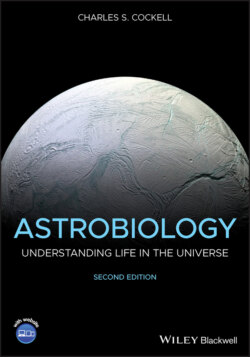Читать книгу Astrobiology - Charles S. Cockell - Страница 123
5.9 Why Did Sexual Reproduction Evolve?
ОглавлениеAsexual reproduction seems to be an extraordinarily successful way to propagate. It accounts for the pervasive presence of prokaryotic single-celled organisms in a vast diversity of habitats on Earth. Yet sexual reproduction persists, and it dominates the reproductive mode of multicellular life. This is a mystery because sex has a twofold cost. What the “twofold cost” means is that because only females of some species can bear young, a 50:50 female:male split of a population of 100 sexually reproducing organisms can only produce 50 offspring in the first generation if each female produces one offspring. However, a population of 100 asexually reproducing organisms dividing once can produce 100 offspring. So why would sex evolve given these costs? Clearly, however, once it did evolve, sex was successful, and it has been selected for since.
We do not know exactly why sex evolved, but there are a number of hypotheses that need not be mutually exclusive. First, we should note that the twofold cost is not strictly true for all species. Isogamous species are species in which males and females are not distinguished, and all members of a species can produce offspring. This counter-argument does not apply to all species, however, so other explanations are required.
Many ideas to explain sex lie in the genetic cross-over process that occurs in meiosis. One potential benefit is that it allows for radical genetic reorganization, with its potential to pass on many genes with combined beneficial effects. Asexually reproducing organisms must wait until different mutations collect over time that together can produce improvements. In sexual reproduction, because an entire segment of chromosome can be passed on from both parents, new large-scale genetic combinations can be tested. Cross-over may further allow genes to escape their surrounding genes, which may be deleterious, and recombine in new beneficial combinations.
Another theory is that sex may have arisen to protect against parasites. Organisms are constantly in a race to catch up with the deleterious effects of parasites. Even without changing physical environments, organisms must adapt constantly to deal with this on-going evolutionary pressure. This has been termed the Red Queen Hypothesis, named after the Red Queen in Lewis Carroll's book Alice in Wonderland, who had to constantly keep running just to stay in one place. Sexual reproduction allows for multiple genes that might be needed in new combinations to resist new parasites to be passed on to offspring and for new arrangements of these genes to be fabricated quickly in evolutionary time.
Yet another concept is that cross-over is a type of DNA repair process. As large segments of DNA are crossed over to form the chromosomes of the progeny, they can be used to patch-up segments of damaged DNA. Related to this concept is the idea that sex is a way of reducing mutational load. Asexually reproducing organisms continue to build up mutations sequentially in their DNA with each round of replication, ratcheting up, generation after generation. This “Muller's ratchet” (first discussed by geneticist Hermann Muller) eventually loads an organism with many potentially lethal mutations. Sexual combinations of genes may provide a mechanism to reduce this load by generating new genetic assortments from mixing of chromosomes from different lineages.
The mystery of sex is interesting because, to return to a time-honored question we have discussed already multiple times, would we presume such a process to be universal? Could we imagine a planet covered in asexually reproducing organisms in which stable genetic systems and populations could persist without sex? Is sex an idiosyncratic system that was “discovered” by evolution and because it provides advantages in certain situations, it has spread and persisted, or is it a system that is somehow essential for the development and emergence of multicellular life? These questions are difficult to answer without a definitive understanding of how sex evolved and what advantages it provides, but they are nevertheless profound. They strongly influence our view of how living things can reproduce and to what different extent systems of reproduction are an ineluctable part of biological evolution or chance events in our own particular evolutionary experiment.
